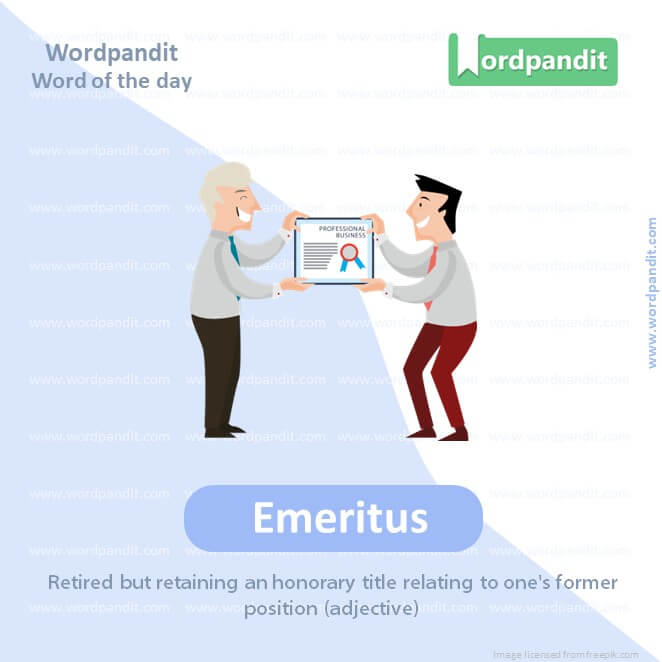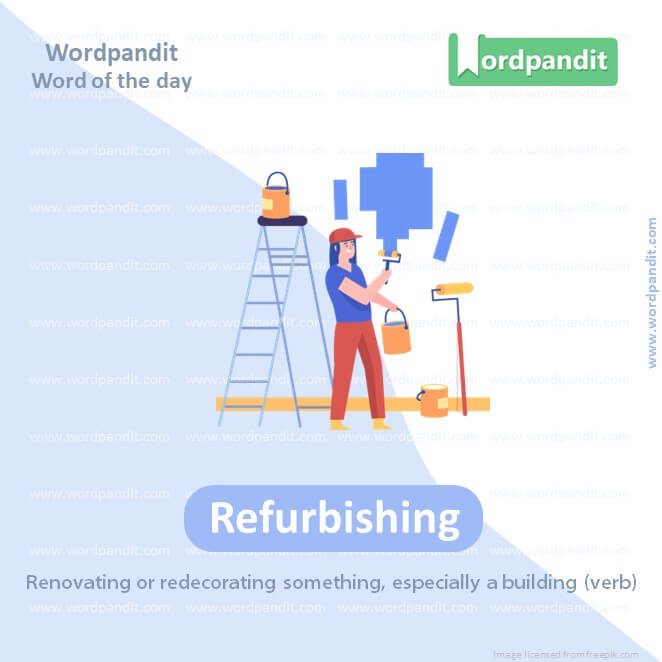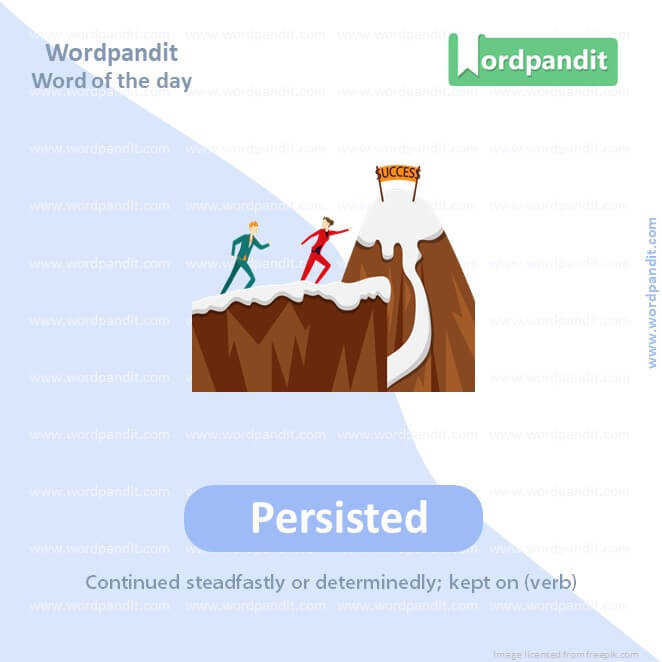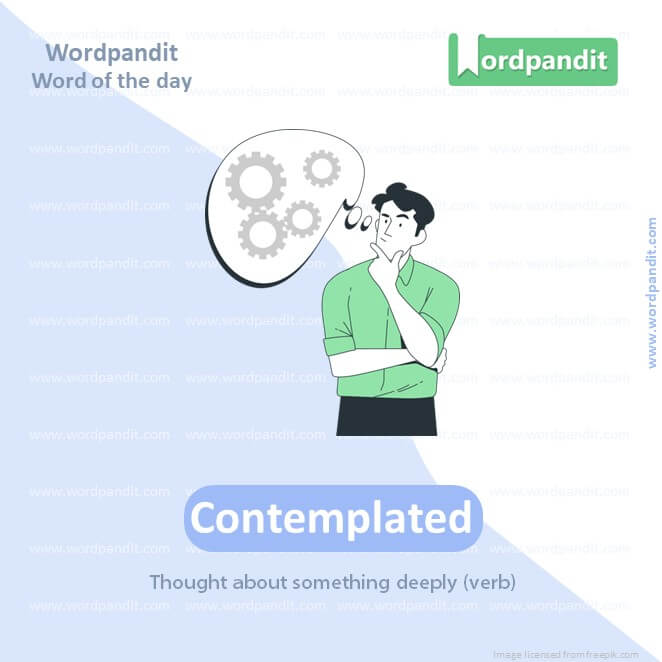Daily Vocabulary Words: List of Daily Used Words in Leading Indian Newspapers
Hi there. Welcome to this special section @ Wordpandit. Our endeavour here is straightforward: highlighting daily vocabulary words that you would come across in leading newspapers in the country. We have included the following newspapers in our selection:
• The Times of India
• The Economic Times
• Hindustan Times
• Mint
• Indian Express
We are putting in extensive work to develop your vocabulary. All you have to do is be regular with this section and check out this post daily. This is your repository of commonly used words; essentially, we are posting a list of daily used words. Hence, this has significant practical application as it teaches you words that are commonly used in leading publications mentioned above.
Visit the website daily to learn words from leading Indian newspapers. WORD-1: ItineraryCONTEXT: India even when the country was hardly on the itinerary of international travellers with deep pockets and Indian business and holiday travel emphasised economy over comfort.SOURCE: Hindustan TimesEXPLANATORY PARAGRAPH: An itinerary is like a special map or a plan for a trip. It tells you where you’re going to go, what you’re going to do, and when you’re going to do it. It’s like a list of places and times that helps you know what to expect on your adventure.MEANING: A planned route or journey (noun).PRONUNCIATION: ih-TIN-uh-rair-eeSYNONYMS: Schedule, Plan, Route, Agenda, Program, Timetable, Travel Plan.USAGE EXAMPLE:
1. We checked our itinerary to see what time the train departs.
2. Her itinerary included stops in four different countries.
3. They received a detailed itinerary for their guided tour.
4. The travel agent helped us plan our itinerary.
WORD-1: ItineraryCONTEXT: India even when the country was hardly on the itinerary of international travellers with deep pockets and Indian business and holiday travel emphasised economy over comfort.SOURCE: Hindustan TimesEXPLANATORY PARAGRAPH: An itinerary is like a special map or a plan for a trip. It tells you where you’re going to go, what you’re going to do, and when you’re going to do it. It’s like a list of places and times that helps you know what to expect on your adventure.MEANING: A planned route or journey (noun).PRONUNCIATION: ih-TIN-uh-rair-eeSYNONYMS: Schedule, Plan, Route, Agenda, Program, Timetable, Travel Plan.USAGE EXAMPLE:
1. We checked our itinerary to see what time the train departs.
2. Her itinerary included stops in four different countries.
3. They received a detailed itinerary for their guided tour.
4. The travel agent helped us plan our itinerary. WORD-2: EmeritusCONTEXT: He was the senior-most hotelier in the country by age and length of service and the chairman emeritus of the third-largest Indian hotel chain.SOURCE: Times of IndiaEXPLANATORY PARAGRAPH: Emeritus is a special word used for someone, usually a teacher or professor, who has retired but is still honored because they were really good at their job. It’s like saying they’re still part of the team because they were so awesome.MEANING: Retired but retaining an honorary title relating to one’s former position (adjective).PRONUNCIATION: eh-MER-ih-tusSYNONYMS: Retired, Honorary, Former, Ex-, Past, Veteran, Distinguished.USAGE EXAMPLE:
1. The professor emeritus attended the college ceremony.
2. She was named professor emerita after her retirement.
3. He is an emeritus member of the board.
4. The lecture was given by an emeritus professor.
WORD-2: EmeritusCONTEXT: He was the senior-most hotelier in the country by age and length of service and the chairman emeritus of the third-largest Indian hotel chain.SOURCE: Times of IndiaEXPLANATORY PARAGRAPH: Emeritus is a special word used for someone, usually a teacher or professor, who has retired but is still honored because they were really good at their job. It’s like saying they’re still part of the team because they were so awesome.MEANING: Retired but retaining an honorary title relating to one’s former position (adjective).PRONUNCIATION: eh-MER-ih-tusSYNONYMS: Retired, Honorary, Former, Ex-, Past, Veteran, Distinguished.USAGE EXAMPLE:
1. The professor emeritus attended the college ceremony.
2. She was named professor emerita after her retirement.
3. He is an emeritus member of the board.
4. The lecture was given by an emeritus professor. WORD-3: RefurbishingCONTEXT: The hotel has undergone complete refurbishing roughly every two decades or so, shutting down for extended periods in the process, but remains the address to be seen at.SOURCE: Indian ExpressEXPLANATORY PARAGRAPH: Refurbishing is like fixing and cleaning something to make it look new again. Imagine if you have a toy that’s old and dirty; if you clean it and paint it, it looks almost new – that’s refurbishing!MEANING: Renovating or redecorating something, especially a building (verb).PRONUNCIATION: ree-FUR-bish-ingSYNONYMS: Renovating, Restoring, Remodeling, Overhauling, Revamping, Renewing, Redecorating.USAGE EXAMPLE:
1. They are refurbishing the old library.
2. The hotel closed for a month for refurbishing.
3. Refurbishing the kitchen increased the home’s value.
4. The museum’s refurbishment took two years.
WORD-3: RefurbishingCONTEXT: The hotel has undergone complete refurbishing roughly every two decades or so, shutting down for extended periods in the process, but remains the address to be seen at.SOURCE: Indian ExpressEXPLANATORY PARAGRAPH: Refurbishing is like fixing and cleaning something to make it look new again. Imagine if you have a toy that’s old and dirty; if you clean it and paint it, it looks almost new – that’s refurbishing!MEANING: Renovating or redecorating something, especially a building (verb).PRONUNCIATION: ree-FUR-bish-ingSYNONYMS: Renovating, Restoring, Remodeling, Overhauling, Revamping, Renewing, Redecorating.USAGE EXAMPLE:
1. They are refurbishing the old library.
2. The hotel closed for a month for refurbishing.
3. Refurbishing the kitchen increased the home’s value.
4. The museum’s refurbishment took two years. WORD-4: PersistedCONTEXT: Biki persisted with his now keen interest and pursued other possibilities.SOURCE: Indian ExpressEXPLANATORY PARAGRAPH: Persisted means to keep trying and not give up, even when things are hard. Like if you are learning to ride a bike and you fall down but get up and try again and again, that’s persisting.MEANING: Continued steadfastly or determinedly; kept on (verb).PRONUNCIATION: per-SIST-edSYNONYMS: Continued, Endured, Persevered, Insisted, Maintained, Carried on, Kept going.USAGE EXAMPLE:
1. Despite the rain, they persisted in their hike.
2. He persisted with his studies despite difficulties.
3. Her cough persisted, so she visited a doctor.
4. They persisted in their efforts to open the shop.
WORD-4: PersistedCONTEXT: Biki persisted with his now keen interest and pursued other possibilities.SOURCE: Indian ExpressEXPLANATORY PARAGRAPH: Persisted means to keep trying and not give up, even when things are hard. Like if you are learning to ride a bike and you fall down but get up and try again and again, that’s persisting.MEANING: Continued steadfastly or determinedly; kept on (verb).PRONUNCIATION: per-SIST-edSYNONYMS: Continued, Endured, Persevered, Insisted, Maintained, Carried on, Kept going.USAGE EXAMPLE:
1. Despite the rain, they persisted in their hike.
2. He persisted with his studies despite difficulties.
3. Her cough persisted, so she visited a doctor.
4. They persisted in their efforts to open the shop. WORD-5: ContemplatedCONTEXT: A giant in the animal feeds and fats industry We contemplated a novel concept.SOURCE: Indian ExpressEXPLANATORY PARAGRAPH: Contemplated means to think really hard about something. Like when you’re trying to decide what toy to play with, and you think about it a lot before choosing, you’re contemplating.MEANING: Thought about something deeply (verb).PRONUNCIATION: KON-tum-play-tidSYNONYMS: Considered, Pondered, Reflected, Meditated, Mulled over, Deliberated, Thought about.USAGE EXAMPLE:
1. She contemplated her options carefully.
2. He sat quietly, contemplating his future.
3. They contemplated moving to a new city.
4. She contemplated the painting for a long time. WORD-6: DemurredCONTEXT: Biki was completely committed to the idea, but the Indonesians demurredSOURCE: Indian ExpressEXPLANATORY PARAGRAPH: Demurred is when you politely disagree or say no to something. It’s like if someone offers you a cookie, but you don’t want it, so you say ‘no thank you’ in a nice way – that’s demurring.MEANING: Expressed objections or hesitations (verb).PRONUNCIATION: dih-MURDSYNONYMS: Objected, Hesitated, Disagreed, Opposed, Protested, Declined, Raised objections.USAGE EXAMPLE:
1. She demurred at the suggestion to postpone the meeting.
2. He demurred, preferring to stay home.
3. They demurred, citing a lack of evidence.
4. When offered the promotion, she demurred, unsure if she wanted it. WORD-7: MightierCONTEXT: They were mightier, faster and more alert — until we formed groups.SOURCE: Indian ExpressEXPLANATORY PARAGRAPH: Mightier means stronger or more powerful. Think of a superhero who is mightier than everyone else because they can lift very heavy things or run really fast.MEANING: More powerful or strong in physical strength or influence (adjective).PRONUNCIATION: MY-tee-erSYNONYMS: Stronger, More powerful, Greater, More influential, Superior, More formidable, More dominant.USAGE EXAMPLE:
1. The new engine is mightier than the old one.
2. In the story, the mightier army won the battle.
3. The mightier team won the championship.
4. With education, she became mightier in her field. WORD-8: FervourCONTEXT: They celebrate each other’s festivals with equal fervour and even have unique Koli names and traditions for them.SOURCE: Times of IndiaEXPLANATORY PARAGRAPH: Fervour is when you feel something very strongly and with a lot of excitement. Like when you really, really love a game and you’re super excited to play it, that’s feeling fervour.MEANING: Intense and passionate feeling (noun).PRONUNCIATION: FUR-vurSYNONYMS: Passion, Enthusiasm, Zeal, Ardor, Intensity, Vigor, Excitement.USAGE EXAMPLE:
1. He spoke with fervour about his project.
2. Her fervour for music was evident.
3. They shared a fervour for environmental conservation.
4. The crowd’s fervour grew as the concert began. WORD-9: GraciouslyCONTEXT: The goddess graciously answers by dropping one or the other side of the offering that is placed on her shoulder.SOURCE: Times of IndiaEXPLANATORY PARAGRAPH: Graciously means doing something in a very polite and kind way. Like when you share your toys with a friend and say ‘please’ and ‘thank you’, you are being gracious.MEANING: In a courteous, kind, and pleasant manner (adverb).PRONUNCIATION: GRAY-shus-leeSYNONYMS: Kindly, Politely, Courteously, Generously, Benevolently, Elegantly, Magnanimously.USAGE EXAMPLE:
1. She graciously accepted the award.
2. He graciously offered his seat to the elderly woman.
3. They were graciously welcomed into the home.
4. She answered the questions graciously, despite being tired. WORD-10: FeminineCONTEXT: The respect that they have for the feminine force is evident in the deities they worship.SOURCE: Times of IndiaEXPLANATORY PARAGRAPH: Feminine is a word that describes things that are usually associated with girls or women. Like dresses or the color pink are often thought of as feminine, but anyone can like them!MEANING: Having qualities traditionally associated with women (adjective).PRONUNCIATION: FEM-uh-ninSYNONYMS: Womanly, Ladylike, Girlish, Delicate, Soft, Maternal, Graceful.USAGE EXAMPLE:
1. The room had a feminine decor.
2. She has a very feminine style of dressing.
3. The perfume had a soft, feminine scent.
4. Her writing expressed a feminine perspective.
WORD-5: ContemplatedCONTEXT: A giant in the animal feeds and fats industry We contemplated a novel concept.SOURCE: Indian ExpressEXPLANATORY PARAGRAPH: Contemplated means to think really hard about something. Like when you’re trying to decide what toy to play with, and you think about it a lot before choosing, you’re contemplating.MEANING: Thought about something deeply (verb).PRONUNCIATION: KON-tum-play-tidSYNONYMS: Considered, Pondered, Reflected, Meditated, Mulled over, Deliberated, Thought about.USAGE EXAMPLE:
1. She contemplated her options carefully.
2. He sat quietly, contemplating his future.
3. They contemplated moving to a new city.
4. She contemplated the painting for a long time. WORD-6: DemurredCONTEXT: Biki was completely committed to the idea, but the Indonesians demurredSOURCE: Indian ExpressEXPLANATORY PARAGRAPH: Demurred is when you politely disagree or say no to something. It’s like if someone offers you a cookie, but you don’t want it, so you say ‘no thank you’ in a nice way – that’s demurring.MEANING: Expressed objections or hesitations (verb).PRONUNCIATION: dih-MURDSYNONYMS: Objected, Hesitated, Disagreed, Opposed, Protested, Declined, Raised objections.USAGE EXAMPLE:
1. She demurred at the suggestion to postpone the meeting.
2. He demurred, preferring to stay home.
3. They demurred, citing a lack of evidence.
4. When offered the promotion, she demurred, unsure if she wanted it. WORD-7: MightierCONTEXT: They were mightier, faster and more alert — until we formed groups.SOURCE: Indian ExpressEXPLANATORY PARAGRAPH: Mightier means stronger or more powerful. Think of a superhero who is mightier than everyone else because they can lift very heavy things or run really fast.MEANING: More powerful or strong in physical strength or influence (adjective).PRONUNCIATION: MY-tee-erSYNONYMS: Stronger, More powerful, Greater, More influential, Superior, More formidable, More dominant.USAGE EXAMPLE:
1. The new engine is mightier than the old one.
2. In the story, the mightier army won the battle.
3. The mightier team won the championship.
4. With education, she became mightier in her field. WORD-8: FervourCONTEXT: They celebrate each other’s festivals with equal fervour and even have unique Koli names and traditions for them.SOURCE: Times of IndiaEXPLANATORY PARAGRAPH: Fervour is when you feel something very strongly and with a lot of excitement. Like when you really, really love a game and you’re super excited to play it, that’s feeling fervour.MEANING: Intense and passionate feeling (noun).PRONUNCIATION: FUR-vurSYNONYMS: Passion, Enthusiasm, Zeal, Ardor, Intensity, Vigor, Excitement.USAGE EXAMPLE:
1. He spoke with fervour about his project.
2. Her fervour for music was evident.
3. They shared a fervour for environmental conservation.
4. The crowd’s fervour grew as the concert began. WORD-9: GraciouslyCONTEXT: The goddess graciously answers by dropping one or the other side of the offering that is placed on her shoulder.SOURCE: Times of IndiaEXPLANATORY PARAGRAPH: Graciously means doing something in a very polite and kind way. Like when you share your toys with a friend and say ‘please’ and ‘thank you’, you are being gracious.MEANING: In a courteous, kind, and pleasant manner (adverb).PRONUNCIATION: GRAY-shus-leeSYNONYMS: Kindly, Politely, Courteously, Generously, Benevolently, Elegantly, Magnanimously.USAGE EXAMPLE:
1. She graciously accepted the award.
2. He graciously offered his seat to the elderly woman.
3. They were graciously welcomed into the home.
4. She answered the questions graciously, despite being tired. WORD-10: FeminineCONTEXT: The respect that they have for the feminine force is evident in the deities they worship.SOURCE: Times of IndiaEXPLANATORY PARAGRAPH: Feminine is a word that describes things that are usually associated with girls or women. Like dresses or the color pink are often thought of as feminine, but anyone can like them!MEANING: Having qualities traditionally associated with women (adjective).PRONUNCIATION: FEM-uh-ninSYNONYMS: Womanly, Ladylike, Girlish, Delicate, Soft, Maternal, Graceful.USAGE EXAMPLE:
1. The room had a feminine decor.
2. She has a very feminine style of dressing.
3. The perfume had a soft, feminine scent.
4. Her writing expressed a feminine perspective.
 WORD-1: ItineraryCONTEXT: India even when the country was hardly on the itinerary of international travellers with deep pockets and Indian business and holiday travel emphasised economy over comfort.SOURCE: Hindustan TimesEXPLANATORY PARAGRAPH: An itinerary is like a special map or a plan for a trip. It tells you where you’re going to go, what you’re going to do, and when you’re going to do it. It’s like a list of places and times that helps you know what to expect on your adventure.MEANING: A planned route or journey (noun).PRONUNCIATION: ih-TIN-uh-rair-eeSYNONYMS: Schedule, Plan, Route, Agenda, Program, Timetable, Travel Plan.USAGE EXAMPLE:
1. We checked our itinerary to see what time the train departs.
2. Her itinerary included stops in four different countries.
3. They received a detailed itinerary for their guided tour.
4. The travel agent helped us plan our itinerary.
WORD-1: ItineraryCONTEXT: India even when the country was hardly on the itinerary of international travellers with deep pockets and Indian business and holiday travel emphasised economy over comfort.SOURCE: Hindustan TimesEXPLANATORY PARAGRAPH: An itinerary is like a special map or a plan for a trip. It tells you where you’re going to go, what you’re going to do, and when you’re going to do it. It’s like a list of places and times that helps you know what to expect on your adventure.MEANING: A planned route or journey (noun).PRONUNCIATION: ih-TIN-uh-rair-eeSYNONYMS: Schedule, Plan, Route, Agenda, Program, Timetable, Travel Plan.USAGE EXAMPLE:
1. We checked our itinerary to see what time the train departs.
2. Her itinerary included stops in four different countries.
3. They received a detailed itinerary for their guided tour.
4. The travel agent helped us plan our itinerary. WORD-2: EmeritusCONTEXT: He was the senior-most hotelier in the country by age and length of service and the chairman emeritus of the third-largest Indian hotel chain.SOURCE: Times of IndiaEXPLANATORY PARAGRAPH: Emeritus is a special word used for someone, usually a teacher or professor, who has retired but is still honored because they were really good at their job. It’s like saying they’re still part of the team because they were so awesome.MEANING: Retired but retaining an honorary title relating to one’s former position (adjective).PRONUNCIATION: eh-MER-ih-tusSYNONYMS: Retired, Honorary, Former, Ex-, Past, Veteran, Distinguished.USAGE EXAMPLE:
1. The professor emeritus attended the college ceremony.
2. She was named professor emerita after her retirement.
3. He is an emeritus member of the board.
4. The lecture was given by an emeritus professor.
WORD-2: EmeritusCONTEXT: He was the senior-most hotelier in the country by age and length of service and the chairman emeritus of the third-largest Indian hotel chain.SOURCE: Times of IndiaEXPLANATORY PARAGRAPH: Emeritus is a special word used for someone, usually a teacher or professor, who has retired but is still honored because they were really good at their job. It’s like saying they’re still part of the team because they were so awesome.MEANING: Retired but retaining an honorary title relating to one’s former position (adjective).PRONUNCIATION: eh-MER-ih-tusSYNONYMS: Retired, Honorary, Former, Ex-, Past, Veteran, Distinguished.USAGE EXAMPLE:
1. The professor emeritus attended the college ceremony.
2. She was named professor emerita after her retirement.
3. He is an emeritus member of the board.
4. The lecture was given by an emeritus professor. WORD-3: RefurbishingCONTEXT: The hotel has undergone complete refurbishing roughly every two decades or so, shutting down for extended periods in the process, but remains the address to be seen at.SOURCE: Indian ExpressEXPLANATORY PARAGRAPH: Refurbishing is like fixing and cleaning something to make it look new again. Imagine if you have a toy that’s old and dirty; if you clean it and paint it, it looks almost new – that’s refurbishing!MEANING: Renovating or redecorating something, especially a building (verb).PRONUNCIATION: ree-FUR-bish-ingSYNONYMS: Renovating, Restoring, Remodeling, Overhauling, Revamping, Renewing, Redecorating.USAGE EXAMPLE:
1. They are refurbishing the old library.
2. The hotel closed for a month for refurbishing.
3. Refurbishing the kitchen increased the home’s value.
4. The museum’s refurbishment took two years.
WORD-3: RefurbishingCONTEXT: The hotel has undergone complete refurbishing roughly every two decades or so, shutting down for extended periods in the process, but remains the address to be seen at.SOURCE: Indian ExpressEXPLANATORY PARAGRAPH: Refurbishing is like fixing and cleaning something to make it look new again. Imagine if you have a toy that’s old and dirty; if you clean it and paint it, it looks almost new – that’s refurbishing!MEANING: Renovating or redecorating something, especially a building (verb).PRONUNCIATION: ree-FUR-bish-ingSYNONYMS: Renovating, Restoring, Remodeling, Overhauling, Revamping, Renewing, Redecorating.USAGE EXAMPLE:
1. They are refurbishing the old library.
2. The hotel closed for a month for refurbishing.
3. Refurbishing the kitchen increased the home’s value.
4. The museum’s refurbishment took two years. WORD-4: PersistedCONTEXT: Biki persisted with his now keen interest and pursued other possibilities.SOURCE: Indian ExpressEXPLANATORY PARAGRAPH: Persisted means to keep trying and not give up, even when things are hard. Like if you are learning to ride a bike and you fall down but get up and try again and again, that’s persisting.MEANING: Continued steadfastly or determinedly; kept on (verb).PRONUNCIATION: per-SIST-edSYNONYMS: Continued, Endured, Persevered, Insisted, Maintained, Carried on, Kept going.USAGE EXAMPLE:
1. Despite the rain, they persisted in their hike.
2. He persisted with his studies despite difficulties.
3. Her cough persisted, so she visited a doctor.
4. They persisted in their efforts to open the shop.
WORD-4: PersistedCONTEXT: Biki persisted with his now keen interest and pursued other possibilities.SOURCE: Indian ExpressEXPLANATORY PARAGRAPH: Persisted means to keep trying and not give up, even when things are hard. Like if you are learning to ride a bike and you fall down but get up and try again and again, that’s persisting.MEANING: Continued steadfastly or determinedly; kept on (verb).PRONUNCIATION: per-SIST-edSYNONYMS: Continued, Endured, Persevered, Insisted, Maintained, Carried on, Kept going.USAGE EXAMPLE:
1. Despite the rain, they persisted in their hike.
2. He persisted with his studies despite difficulties.
3. Her cough persisted, so she visited a doctor.
4. They persisted in their efforts to open the shop. WORD-5: ContemplatedCONTEXT: A giant in the animal feeds and fats industry We contemplated a novel concept.SOURCE: Indian ExpressEXPLANATORY PARAGRAPH: Contemplated means to think really hard about something. Like when you’re trying to decide what toy to play with, and you think about it a lot before choosing, you’re contemplating.MEANING: Thought about something deeply (verb).PRONUNCIATION: KON-tum-play-tidSYNONYMS: Considered, Pondered, Reflected, Meditated, Mulled over, Deliberated, Thought about.USAGE EXAMPLE:
1. She contemplated her options carefully.
2. He sat quietly, contemplating his future.
3. They contemplated moving to a new city.
4. She contemplated the painting for a long time. WORD-6: DemurredCONTEXT: Biki was completely committed to the idea, but the Indonesians demurredSOURCE: Indian ExpressEXPLANATORY PARAGRAPH: Demurred is when you politely disagree or say no to something. It’s like if someone offers you a cookie, but you don’t want it, so you say ‘no thank you’ in a nice way – that’s demurring.MEANING: Expressed objections or hesitations (verb).PRONUNCIATION: dih-MURDSYNONYMS: Objected, Hesitated, Disagreed, Opposed, Protested, Declined, Raised objections.USAGE EXAMPLE:
1. She demurred at the suggestion to postpone the meeting.
2. He demurred, preferring to stay home.
3. They demurred, citing a lack of evidence.
4. When offered the promotion, she demurred, unsure if she wanted it. WORD-7: MightierCONTEXT: They were mightier, faster and more alert — until we formed groups.SOURCE: Indian ExpressEXPLANATORY PARAGRAPH: Mightier means stronger or more powerful. Think of a superhero who is mightier than everyone else because they can lift very heavy things or run really fast.MEANING: More powerful or strong in physical strength or influence (adjective).PRONUNCIATION: MY-tee-erSYNONYMS: Stronger, More powerful, Greater, More influential, Superior, More formidable, More dominant.USAGE EXAMPLE:
1. The new engine is mightier than the old one.
2. In the story, the mightier army won the battle.
3. The mightier team won the championship.
4. With education, she became mightier in her field. WORD-8: FervourCONTEXT: They celebrate each other’s festivals with equal fervour and even have unique Koli names and traditions for them.SOURCE: Times of IndiaEXPLANATORY PARAGRAPH: Fervour is when you feel something very strongly and with a lot of excitement. Like when you really, really love a game and you’re super excited to play it, that’s feeling fervour.MEANING: Intense and passionate feeling (noun).PRONUNCIATION: FUR-vurSYNONYMS: Passion, Enthusiasm, Zeal, Ardor, Intensity, Vigor, Excitement.USAGE EXAMPLE:
1. He spoke with fervour about his project.
2. Her fervour for music was evident.
3. They shared a fervour for environmental conservation.
4. The crowd’s fervour grew as the concert began. WORD-9: GraciouslyCONTEXT: The goddess graciously answers by dropping one or the other side of the offering that is placed on her shoulder.SOURCE: Times of IndiaEXPLANATORY PARAGRAPH: Graciously means doing something in a very polite and kind way. Like when you share your toys with a friend and say ‘please’ and ‘thank you’, you are being gracious.MEANING: In a courteous, kind, and pleasant manner (adverb).PRONUNCIATION: GRAY-shus-leeSYNONYMS: Kindly, Politely, Courteously, Generously, Benevolently, Elegantly, Magnanimously.USAGE EXAMPLE:
1. She graciously accepted the award.
2. He graciously offered his seat to the elderly woman.
3. They were graciously welcomed into the home.
4. She answered the questions graciously, despite being tired. WORD-10: FeminineCONTEXT: The respect that they have for the feminine force is evident in the deities they worship.SOURCE: Times of IndiaEXPLANATORY PARAGRAPH: Feminine is a word that describes things that are usually associated with girls or women. Like dresses or the color pink are often thought of as feminine, but anyone can like them!MEANING: Having qualities traditionally associated with women (adjective).PRONUNCIATION: FEM-uh-ninSYNONYMS: Womanly, Ladylike, Girlish, Delicate, Soft, Maternal, Graceful.USAGE EXAMPLE:
1. The room had a feminine decor.
2. She has a very feminine style of dressing.
3. The perfume had a soft, feminine scent.
4. Her writing expressed a feminine perspective.
WORD-5: ContemplatedCONTEXT: A giant in the animal feeds and fats industry We contemplated a novel concept.SOURCE: Indian ExpressEXPLANATORY PARAGRAPH: Contemplated means to think really hard about something. Like when you’re trying to decide what toy to play with, and you think about it a lot before choosing, you’re contemplating.MEANING: Thought about something deeply (verb).PRONUNCIATION: KON-tum-play-tidSYNONYMS: Considered, Pondered, Reflected, Meditated, Mulled over, Deliberated, Thought about.USAGE EXAMPLE:
1. She contemplated her options carefully.
2. He sat quietly, contemplating his future.
3. They contemplated moving to a new city.
4. She contemplated the painting for a long time. WORD-6: DemurredCONTEXT: Biki was completely committed to the idea, but the Indonesians demurredSOURCE: Indian ExpressEXPLANATORY PARAGRAPH: Demurred is when you politely disagree or say no to something. It’s like if someone offers you a cookie, but you don’t want it, so you say ‘no thank you’ in a nice way – that’s demurring.MEANING: Expressed objections or hesitations (verb).PRONUNCIATION: dih-MURDSYNONYMS: Objected, Hesitated, Disagreed, Opposed, Protested, Declined, Raised objections.USAGE EXAMPLE:
1. She demurred at the suggestion to postpone the meeting.
2. He demurred, preferring to stay home.
3. They demurred, citing a lack of evidence.
4. When offered the promotion, she demurred, unsure if she wanted it. WORD-7: MightierCONTEXT: They were mightier, faster and more alert — until we formed groups.SOURCE: Indian ExpressEXPLANATORY PARAGRAPH: Mightier means stronger or more powerful. Think of a superhero who is mightier than everyone else because they can lift very heavy things or run really fast.MEANING: More powerful or strong in physical strength or influence (adjective).PRONUNCIATION: MY-tee-erSYNONYMS: Stronger, More powerful, Greater, More influential, Superior, More formidable, More dominant.USAGE EXAMPLE:
1. The new engine is mightier than the old one.
2. In the story, the mightier army won the battle.
3. The mightier team won the championship.
4. With education, she became mightier in her field. WORD-8: FervourCONTEXT: They celebrate each other’s festivals with equal fervour and even have unique Koli names and traditions for them.SOURCE: Times of IndiaEXPLANATORY PARAGRAPH: Fervour is when you feel something very strongly and with a lot of excitement. Like when you really, really love a game and you’re super excited to play it, that’s feeling fervour.MEANING: Intense and passionate feeling (noun).PRONUNCIATION: FUR-vurSYNONYMS: Passion, Enthusiasm, Zeal, Ardor, Intensity, Vigor, Excitement.USAGE EXAMPLE:
1. He spoke with fervour about his project.
2. Her fervour for music was evident.
3. They shared a fervour for environmental conservation.
4. The crowd’s fervour grew as the concert began. WORD-9: GraciouslyCONTEXT: The goddess graciously answers by dropping one or the other side of the offering that is placed on her shoulder.SOURCE: Times of IndiaEXPLANATORY PARAGRAPH: Graciously means doing something in a very polite and kind way. Like when you share your toys with a friend and say ‘please’ and ‘thank you’, you are being gracious.MEANING: In a courteous, kind, and pleasant manner (adverb).PRONUNCIATION: GRAY-shus-leeSYNONYMS: Kindly, Politely, Courteously, Generously, Benevolently, Elegantly, Magnanimously.USAGE EXAMPLE:
1. She graciously accepted the award.
2. He graciously offered his seat to the elderly woman.
3. They were graciously welcomed into the home.
4. She answered the questions graciously, despite being tired. WORD-10: FeminineCONTEXT: The respect that they have for the feminine force is evident in the deities they worship.SOURCE: Times of IndiaEXPLANATORY PARAGRAPH: Feminine is a word that describes things that are usually associated with girls or women. Like dresses or the color pink are often thought of as feminine, but anyone can like them!MEANING: Having qualities traditionally associated with women (adjective).PRONUNCIATION: FEM-uh-ninSYNONYMS: Womanly, Ladylike, Girlish, Delicate, Soft, Maternal, Graceful.USAGE EXAMPLE:
1. The room had a feminine decor.
2. She has a very feminine style of dressing.
3. The perfume had a soft, feminine scent.
4. Her writing expressed a feminine perspective. vocabulary in use
Title: “Maximizing Learning Efficiency: Mastering the ‘Vocabulary in Use'”In the realm of language education, the concept of ‘vocabulary in use’ is exceptionally integral. It refers not merely to the memorization of words, but the practical application of those words within context-rich sentences and conversation. Essentially, ‘vocabulary in use’ stands as the wholesome approach to learning words and phrases the way they are prevalently used in language.Many language learners stumble upon the roadblock of using vocabulary out of context. Hence, to prevent such linguistic disaster, ‘vocabulary in use’ comes as a rescue. It encourages learners to understand the words, their meanings, nuances, and appropriate application, making language use more authentic and natural.How should ‘vocabulary in use’ be learned? The efficient approach to this is shifting from the age-old tradition of rote memorization to a modern application-based learning strategy. Put simply, it involves immersing oneself in a language-rich environment. For instance, you may read books, watch series, engage in conversations, or listen to music in your target language. This provides opportunities to encounter ‘vocabulary in use’ in its natural context, which facilitates deeper understanding, recall, and appropriate usage.Deconstructing the ‘vocabulary in use’ further, learners should focus both on the meaning and usage of new words. Once a learner encounters a new word, they shouldn’t just learn what it means – they should also learn how and when it’s used. This provides an understanding of the contextual and stylistic application of the word.To conclude, ‘vocabulary in use’ is an anchor point in language learning. This approach goes beyond plain memorization and encourages understanding words in their practical and conversational contexts. A conscious effort to learn ‘vocabulary in use’ can, indeed, enhance linguistic fluency, competency, and overall communication skills. As you journey to language mastery, remember, ‘vocabulary in use’ is your quintessential comrade!






